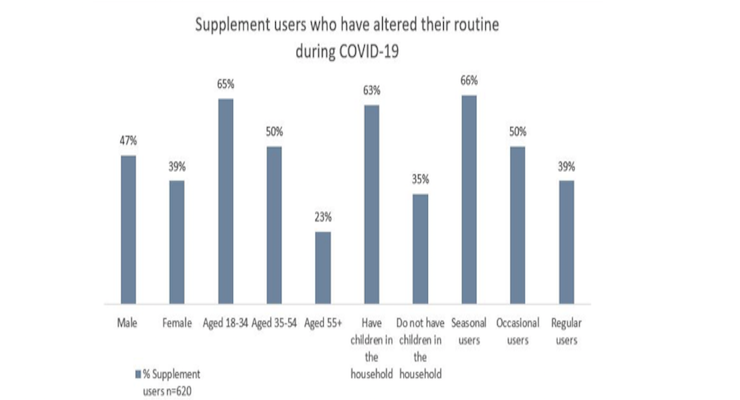Market Updates
CRN/Ipsos Break Down Trends in COVID-19 Supplement Usage
According to consumers, the sweeping changes they’ve made to their nutrition routines are likely to be sustained.

By: Mike Montemarano

The Council for Responsible Nutrition (CRN) shared some of its topline results from a survey of supplement users, and non-users, conducted jointly by CRN and market research company Ipsos, which highlighted some statistical trends in regard to the dramatic rise of dietary supplement usage seen since the onset of the COVID-19 pandemic. The survey was fielded beginning on July 31 and ending on Aug.4, and contains data from a national sample of 2,004 adults living in the U.S. 1,488 of the respondents said they were dietary supplement users, and 620 of those users reported changing their routines since the onset of the pandemic.
More than two in five (43%) supplement users report that they’ve changed their routines since the beginning of the pandemic, with 91% of those changes being an increase in supplement intake, such as by adding new supplements to their existing routines (46%), taking the same supplements more regularly (25%), or increasing doses (22%).
47% of male and 39% of female dietary supplement users who were surveyed said that they’ve changed their routine, and, for both genders, change-ups were more prominent in the 18-34-year-old age bracket (65%), followed by those aged 35-54 (50%) and then those ages 55 and up (23%).
Seasonal users (66%) and those who have children in the household (63%) were most likely to alter their supplement routine, followed by those who consider themselves occasional users (50%), regular users (39%) and, lastly, those who have no children in the household (35%).
“As consumers continue to confront the devastating public health effects of COVID-19, Americans are focused more than ever on their overall health and well-being,” Brian Wommack, senior vice president of Communications for CRN, said. “As evidenced in the survey, dietary supplements continue to play a critical role in the lives of most Americans, and even more so in light of the ongoing health crisis. More than three quarters of Americans report taking dietary supplements and the overwhelming majority of supplement users, 83%, believe these products play an important role in helping to support health and wellness during COVID-19.”
The top two reasons why supplement routines have been increased, according to the survey, was for overall immune support (57%) and health/wellness benefits (53%). 42% specifically cited reducing the risk of serious illness as a reason, while 34% said that they sought to take greater control over their health.
Of all the supplements which users report using at increased rates, the multivitamin (59%) led the charge, followed by vitamins C (44%) and D (37%), zinc (17%), calcium (16%), iron (15%), vitamin B/ B Complex (15%), magnesium (14%), protein (14%), green tea (13%), energy drinks (13%), vitamin E (12%), and lastly, fiber (11%).
An 85% majority of Americans who participated in the survey said that the pandemic is a reminder to take care of their overall health. Interestingly, supplement users were more likely to report engaging in other healthy habits, such as staying hydrated, eating healthy, exercising regularly, and managing stress, than their non-user counterparts.
“CRN and Ipsos’ recent survey demonstrates that in the light of the pandemic, most supplement users believe it is important that they continue incorporating dietary supplements into their lifestyle (88%), with many supplement users actually increasing their intake of dietary supplements,” Chris Jackson, senior vice president of public affairs at Ipsos, said. “The data not only show increases in supplement intake throughout the pandemic, but point to sustained usage in the future as nearly all supplement users who changed their regimen (98%) indicate that they are likely to continue with their current dietary supplement routine moving forward. This data point, paired with supplement users’ sustained engagement in healthy lifestyle habits, suggests lasting changes as consumers continue to confront this public health crisis.”
In addition to the COVID-19 survey, CRN reports that its annual Consumer Survey on Dietary Supplements is slated for later this fall – both surveys will be available for purchase to CRN members and non-members alike.


